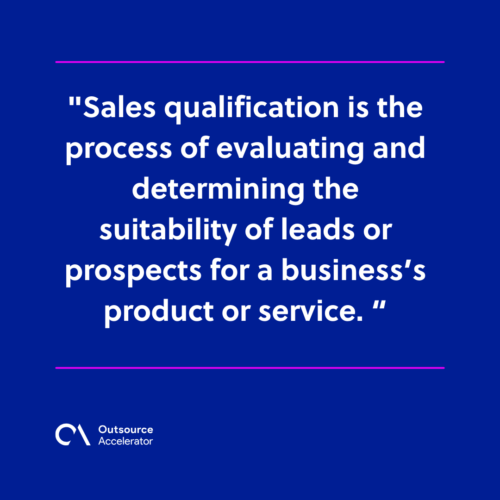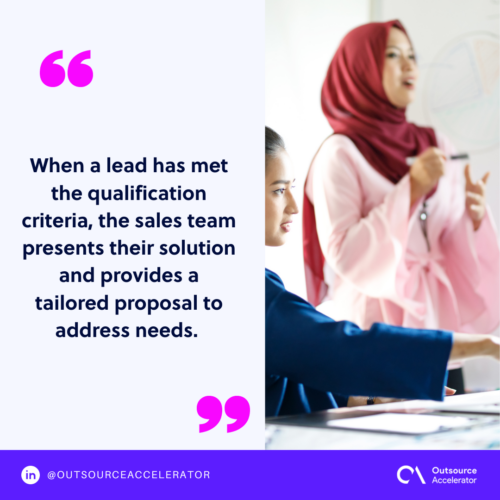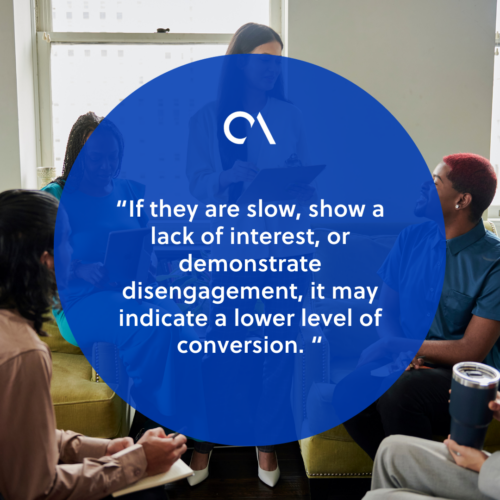Understanding the value of sales qualification

It’s exhausting chasing down leads with no potential for conversion. This is why sales qualification is more important than ever.
By implementing effective sales qualification strategies, businesses can streamline their sales processes, increase conversion rates, and drive revenue growth.
This article explores the key facets that empower sales teams to prioritize and precisely pursue prospects. From understanding the nuances of lead qualification to harnessing the power of data-driven insights, we look at the ins and outs of sales qualification.
What is sales qualification?
Sales qualification is the process of evaluating and determining the suitability of leads or prospects for a business’s product or service. The primary objective is to identify and prioritize leads who are most likely to convert into customers.
This involves analyzing the lead’s various aspects, such as needs, budget, authority to purchase, and timeline to make a decision. Through a systematic sales qualification process, sales professionals can focus on the most promising prospects to close sales.
Effective sales qualification is instrumental in enhancing a sales team’s overall productivity and success.

Importance of sales qualification
Sales qualification plays a vital role in the success of any business. Here are some key reasons why it’s important:
Higher conversion rates
Sales qualification ensures that the sales team engages with higher prospects who have a genuine need for the product or service, the authority to purchase, and the budget to do so.
This results in higher conversion rates, as the sales efforts are directed towards more promising leads.
Efficient resource allocation
By qualifying leads, businesses can allocate their resources strategically and focus on prospects that are more likely to convert. This ensures that valuable resources are not wasted on leads that are unlikely to result in sales.
Improved customer targeting
Sales qualification helps businesses understand their target audience better. By evaluating leads for specific criteria that align with their ideal customer profile, businesses can tailor their sales approach, messaging, and offerings to match their needs and preferences.
Streamlined sales process
Sales qualification helps streamline the sales process by providing a clear roadmap for sales teams.
Qualified leads are often closer to making a purchase decision. By prioritizing these prospects, sales teams can shorten the sales cycle and reduce the time it takes to close deals.
This also decreases the risk of churn or customer dissatisfaction.
Enhanced customer satisfaction
When leads are well-qualified, the likelihood of meeting their specific needs and expectations increases. This leads to more meaningful conversations, better alignment of expectations, and higher customer satisfaction levels.
Stages in sales qualification process
The sales qualification process is a systematic approach that involves several stages to assess and prioritize leads effectively. While specific methods and frameworks may vary between companies, the following are the most common stages:
Lead identification
This stage identifies and gathers information about potential leads. It may include lead generation activities such as:
- Advertising
- Inbound marketing
- Outbound prospecting
- Content marketing
- Networking
This stage also has leads pre-qualified based on basic criteria to ensure they align with the target customer profile.
Initial contact
Once leads are identified, the sales team initiates contact to establish a connection and qualify interest and fit for the product or service.
The sales team may do this through phone calls, emails, or social media outreach.
Needs assessment
During this stage, the sales professional conducts a thorough needs assessment to understand the lead’s challenges, pain points, and specific requirements. This information is crucial to determine how the product or service can provide them value.
Decision-making process
This stage investigates and understands the lead’s decision-making process, including key stakeholders, influencers, and decision criteria. It helps the sales team tailor their approach and address potential obstacles or objections.
Qualification criteria
Businesses often define specific qualification criteria or frameworks to assess whether a lead is a good fit for their product or service. This stage is where sales teams strictly evaluate leads according to those criteria.
These factors can include:
- Budget
- Timeline
- Authority
- Need
- Overall target fit
Sales presentation and proposal
When a lead has met the qualification criteria, the sales team presents their solution and provides a tailored proposal to address needs. They should aim to convince the lead that the product or service can solve their challenges effectively.

Close and follow-up
The final stage involves closing the sale, negotiating contracts, and finalizing the agreement. Additionally, maintaining ongoing communication and follow-up with the customer is essential to building long-term relationships.
The customer is then passed on to the department that handles the onboarding and delivery phase. It’s important to note that the specific stages and terminology may vary depending on the sales qualification approach.
By progressing through these stages, sales teams can systematically increase the likelihood of closing deals with qualified prospects.
Techniques to use in sales qualification
Effective sales qualification employs various techniques to gather relevant information and identify prospects with the most potential for conversion.
Here are some commonly used techniques in sales qualification:
BANT criteria
Budget, Authority, Need, and Timeline (BANT) is a framework that helps sales teams assess a lead’s readiness to purchase by asking questions related to these four key areas.
It helps determine if the prospect has the budget, decision-making authority, immediate need, and a specific timeline for making a purchase.
SPIN selling
Situation, Problem, Implication, Need payoff (SPIN) is a technique that helps sales professionals uncover a prospect’s challenges and needs.
Sales teams ask specific questions in these four categories. It gives them a deeper understanding of the prospects’ pain points, their implications, and how the product or service can provide a solution.
MEDDIC framework
Metrics, Economic buyer, Decision criteria, Decision process, Implicate the pain, Champion (MEDDIC) is a framework that’s commonly used in B2B sales.
This technique helps sales professionals navigate decision-making, identify key stakeholders, and align their selling strategy with the prospect’s requirements.
CHAMP methodology
Challenges, Authority, Money, Prioritization (CHAMP) is a sales qualification model focusing on key buying process aspects.
It explores the prospect’s challenges, confirms the decision-making authority, discusses budget considerations, and understands the prospect’s priorities.
Qualification questions
Asking targeted and relevant questions is a crucial technique in sales qualification. Through questions, sales professionals can gather critical information.
Open-ended and probing questions can help uncover key insights and better understand the prospect’s situation.
Ideal customer profile analysis
Creating an ideal customer profile helps sales teams target their efforts on leads that fit their target market.
Sales professionals analyze key characteristics of existing successful customers, which can include:
- Industry
- Company size
- Pain points
- Demographics
Active listening
Actively listening to the prospect’s responses, needs, and concerns is a powerful technique in sales qualification. Listening attentively and empathizing with them allows you to tailor your sales approach and establish a strong rapport.
Sales qualification scorecard
Implementing a sales qualification scorecard or rating system can help sales teams objectively evaluate leads. This method assigns numerical scores based on predefined criteria.
This technique allows for consistent and standardized lead qualification and helps prioritize efforts.
Referral qualification
This technique leverages referrals from existing satisfied customers. Referrals often have a higher level of trust and interest in the offering.
Brands may choose to combine and customize these techniques to enhance their ability to qualify leads accurately.
Sales qualification: When to qualify or disqualify a prospect
Qualifying or disqualifying a sales prospect is a critical decision that’s actually made at different points of the sales qualification process. Knowing when to do so is crucial to efficient use of resources and focus on potential leads.
Here are some key indicators to consider for both scenarios:
Alignment with ideal customer profile
Compare the prospect’s characteristics, needs, and challenges with your ideal customer profile. If they align closely with your target market and they have a genuine need for your product or service, it’s worth qualifying them further.
Budget and resources
Assess the prospect’s budget and available resources to determine if they can afford your product or service.
If the prospect does not have the financial capability to make a purchase, it may be necessary to disqualify them. Alternatively, you can explore options like down-selling or offering a scaled-down, lower-tier solution.
Decision-making authority
Identify if the prospect has the authority and power to make purchasing decisions or influence the decision-making process. If the prospect lacks this authority, it’s not likely they’ll drive the sales process forward. Pain points and needs
Evaluate whether your product or service can effectively address the prospect’s pain points and needs.
If their challenges don’t align with what your offering can provide, it may be best to disqualify them early on. Doing so avoids unnecessary efforts and allows you to focus on prospects with a more suitable fit.
Timelines and urgency
Consider the prospect’s timeline for making a purchasing decision.
If their timeline doesn’t align with your sales cycle or if there is an urgency mismatch, it may be beneficial to disqualify them for now. You can prioritize other prospects who have a more immediate need for your solution.
Engagement and interest level
Assess the prospect’s level of engagement and interest throughout the sales process. If they are slow, show a lack of interest, or demonstrate disengagement, it may indicate a lower level of conversion.
In such cases, it may be necessary to disqualify.

Compliance with qualification criteria
If the prospect doesn’t meet the predefined qualification criteria or fails to fulfill specific requirements, you may need to disqualify them.
For example, if the prospect doesn’t meet industry-specific criteria or the minimum revenue threshold, you should disqualify them from further consideration.
Refining your sales qualification process
Sales qualification is an ongoing process, and prospects may move in and out based on changes in their needs, circumstances, or readiness to make a purchase. It’s best to assess and evaluate your process regularly to stay attuned to any shifts.
Outsourcing to SixEleven to refine your sales qualification process can make all the difference between hitting your targets and falling short.
With a well-tailored strategy, you can streamline your sales pipeline, boost conversion rates, and drive revenue growth. Remember, in the sales world, efficiency and precision are the keys to victory, and it all begins with effective qualification.
Happy selling!







 Independent
Independent




